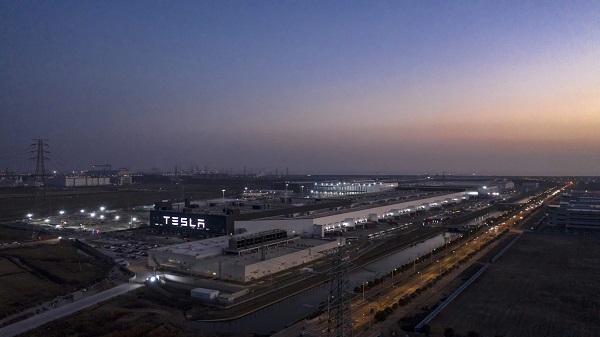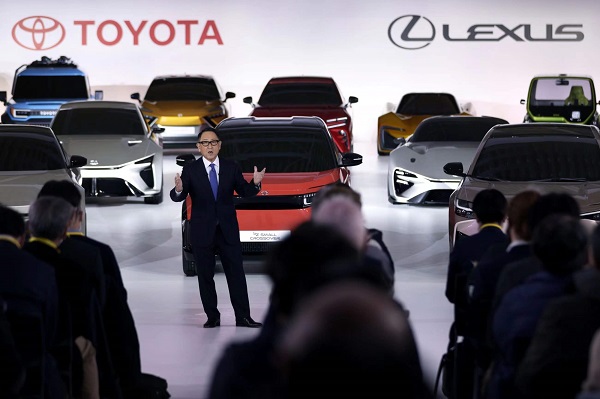Volkswagen and Toyota defend their turf in a way that is very different from the proud German and Japanese industrial giants one can usually imagine, and executives at both companies know all too well that the transition away from the internal combustion engine will not be an orderly progression.
An epic battle
This epic battle to control the future of the auto industry will get even more thrilling.
As a pioneer and frontrunner, Tesla dominated the first few rounds of the new energy era, captured the imagination of investors with its vision for the appearance of the next generation of cars, and occupied the nascent pure electric vehicle market.

On the other side of the arena are two super giants: Volkswagen and Toyota. The world’s two largest automakers — which sold 10 and 11 times as many cars as Elon Musk last year, respectively — realized the age of electric vehicles was coming and began figuring out how to stay ahead.
In December 2021, the two auto production giants came up with plans less than five days apart to invest a combined $170 billion over the next few years in a bid to preserve their decades of dominance in the industry.
Executives at both companies are well aware that the transition away from the internal combustion engine will not be an orderly progression. The scene could be very tragic – similar to Apple’s entry into the mobile phone market and far more than the one-time hegemony Nokia.
During a year of massive growth that saw Tesla become the most valuable automaker ever, the trillion-dollar market value raises the question of whether Musk’s advantage will be as good as the new era of auto manufacturing.
“When the two largest car companies in the world decide to go all-in on electric vehicles, there’s no longer a question of opportunism—the mainstream players are going electric,” said Andy Palmer. Palmer was once known as the “Godfather of Electric Vehicles.” “I predict that the transition to electric vehicles will be faster than everyone expects.”
Volkswagen and Toyota defend their turf in a very different way than one can usually imagine. One is aggressive and has Tesla in full view; the other, while investing heavily in electric vehicles, continues to spread its bets and wait for an opportunity as the early stages of change arrive.
Volkswagen’s electric vehicles
The industry giant that competes fiercely with Musk is Volkswagen. After 84 years of development and growth, the company has 12 brands, has factories in about 120 locations around the world, and has more employees than Detroit’s population.
The Volkswagen Group, with annual revenue of about $280 billion, produces models such as the Volkswagen-branded Tiguan and Passat, as well as the Lamborghini supercar and Scania heavy-duty trucks.
In every year that CEO Herbert Diess has run the company, Volkswagen has announced an unrivaled electrification budget. On December 9, 2021, he unveiled his largest plan to date, spending 89 billion euros over the next five years on electric vehicles and software development.
Diess has always used Musk as a reference point, so much so that he has to admit that he annoyed some inside the company. Last October, he unexpectedly invited Musk to a high-level meeting of 200 company executives.
VW’s initial foray into the electric car market was with luxury models like the Audi e-tron and Porsche Taycan. In 2021, the company is trying to make a splash with more mainstream models — the ID.3 hatchback and ID.4 sport-utility vehicle (SUV).
Diess said at the Battery Day event in March 2021: “Our transformation will be very rapid and larger than any transformation in the past.”
In the first 10 months of 2021, Volkswagen delivered about 322,000 all-electric vehicles, slightly more than half of its sales target of 600,000. Analysts expect Volkswagen to sell around 450,000 electric vehicles this year.
By the end of the year, the powertrain shared by the ID.3 and ID.4 will be used in 27 electrified models. Volkswagen will increase its electric vehicle plants from five to eight in Germany, China and the Czech Republic, while two other plants in Germany and an assembly plant in the United States will also start production.
Volkswagen’s high-class electric vehicles have also achieved good results. For example, the Porsche Taycan is expected to outsell the iconic 911 sports car. Porsche will also introduce more electric models, with an all-electric version of its best-selling Macan SUV expected next year.
Toyota’ s electrification
Two months ago, Toyota showed its model for the long-term future. While Toyota is preparing to launch the bZ4X electric SUV, Akio Toyoda is driving a Corolla Sport H2 concept with a hydrogen-fueled engine on the track.

In December 2021, Akio Toyoda unveiled Toyota’s “future showroom”.
“In the face of uncertainty, we need diverse solutions. We don’t want to tie ourselves to the only option,” Toyoda said at a Nov. 13 news conference.
Diversity is one thing, not at all is another. Toyota, best known for its hybrid pioneer Prius, admits it was “a little late” to the launch of an all-electric model — that was four years ago. Toyota’s first electric vehicle for the global mass market is expected to hit the market in the middle of this year.
But a few weeks after test driving a hydrogen concept car, Toyoda showed an unprecedented range of future-oriented products.
Five electric cars flanked him as the first curtain opened. Then, another curtain opened, showing 11 electric vehicles. “Welcome to our showroom of the future,” he said, as Toyota prepares to launch 30 electric vehicles by 2030.
Toyota is preparing to invest about $70 billion during this period, half of which will be in fully electric models. Annual sales of electric vehicles will reach 3.5 million units by 2029.
The cautious rhetoric from Toyota executives is a far cry from the general surge in enthusiasm for electric vehicles in the auto industry.
Anders Schelde, chief investment officer at the Danish pension fund Akademiker Pension, which owns Toyota shares, said last summer he did not see management’s approach to electric vehicles as a long-term winning strategy.
Hybrid & hydrogen
The Tokyo EV launch in December 2021 is the latest in a series of festivities held by Toyota around the world. The company says it will stick to the hybrid road and hopes that hydrogen-fueled vehicles, which have spent years of investment and research, will be favored alongside electric vehicles.
Hybrid sales are still expected to outsell pure electric vehicles for years to come, and in early December Toyota said it would sell only zero-emission vehicles in Europe by 2035. A few days later, the company announced that it would invest $1.29 billion in its first battery factory in the United States.
Volkswagen’s move
Meanwhile, Volkswagen’s move to electric vehicles shows that the transition to electrification is more than just flipping a switch.
Tesla is also working on plans. The company has also planned to invest up to 188 million US dollars to upgrade the Shanghai plant and increase the existing annual production capacity of 450,000 vehicles.
Two new assembly plants are also preparing to start production of the Model Y. Tesla’s head of investor relations, Martin Viecha, said at a recent Deutsche Bank meeting that wait times for the Model 3 and Y have been extended to more than six months.
Given that the market demand for electric vehicles clearly exceeds the industry’s production capacity, the success of electric vehicles no longer depends on orders, but on production capacity, the ability to ensure supply and optimal costs, and Tesla believes that it has a considerable leading advantage in this regard.
Others believe that Tesla will lose its seat in the electric car market as new entrants continue to join. IHS Markit expects Tesla’s U.S. electric vehicle market share to fall to 20 percent by 2025, from just over 50 percent today.
The huge investment “will put Toyota and Volkswagen in a good position to compete with EV specialists. Traditional automakers have certain advantages over start-ups, such as scale, manufacturing experience and brand loyalty.”
In addition to tweaking their respective assembly lines and model offerings, Volkswagen and Toyota will have to catch up to Tesla in software.



